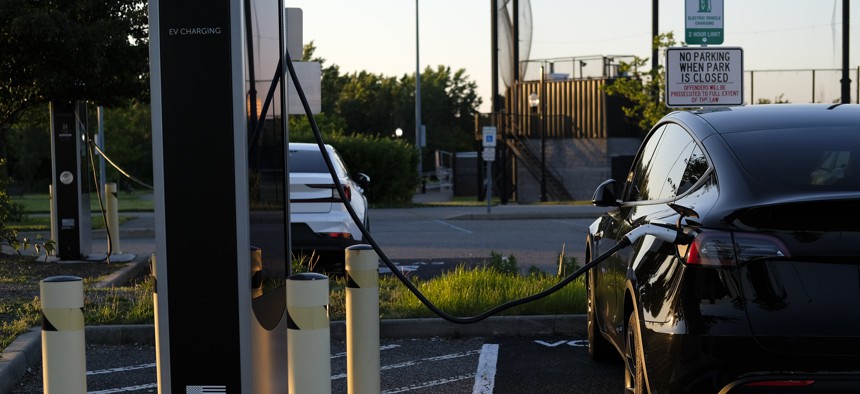$700M in Grants for Local EV Chargers Announced

Kena Betancur/VIEW press via Getty Images
The competitive grants are designed to install electric vehicle chargers in local communities where private entities are otherwise less likely to build them.
The Biden administration opened up applications Tuesday for $700 million in grants for local governments and other entities to install electric vehicle chargers in their communities, a long-awaited step of rolling out the federal government’s 2021 infrastructure law.
Unlike earlier rounds of funding to help states build a national charging network, the competitive grants announced this week are designed to fill in gaps where chargers are less likely to be installed by private entities.
Money from the new Charging and Fueling Infrastructure (CFI) grant program will help cities, counties and tribal governments provide chargers in rural areas, downtowns, residential neighborhoods and underserved areas. Those governments can also use the money to build out alternative fuel corridors where needed.
Biden administration officials expect that most of the money going to local governments will be used to build Level 2 chargers, rather than the “fast chargers” mandated along highways paid for with state grants. The slower chargers are easier to build and more practical for local residents than fast chargers, which are usually geared for motorists on long trips.
“Extending EV charging infrastructure into traditionally underserved areas will ensure that equitable and widespread EV adoption takes hold,” Energy Secretary Jennifer Granholm said in a statement. “Ensuring that charging stations are more visible and accessible in our communities addresses the concerns many American drivers have when considering making the switch to electric.”
The 2021 infrastructure law designated $7.5 billion over five years to build out charging stations for vehicles running on electricity, hydrogen and other alternative fuels.
The vast majority of that—$5 billion—is dedicated to the National Electric Vehicle Infrastructure (NEVI) formula program, which is designed to build chargers along key highways nationwide. States will automatically receive their allotments of that money, as long as they submit plans for their networks and update the federal government on their progress.
The money for the grants announced Tuesday comes from the other $2.5 billion in the infrastructure law. Half of that money is designated for “community” uses, such as chargers at public buildings, streets, schools, parks or accessible (and free) parking lots on private property. The other half is set aside for “corridor” improvements, which target the same kinds of highways as the state programs.
The Biden administration noted that it wants to promote traffic safety, environmental sustainability, investment in disadvantaged communities and job creation with the grants it awards. It also called on applicants for community grants to use a “dig once” approach, to avoid repeated and expensive upgrades to the charging infrastructure that is installed.
Corinne Kisner, the executive director of the National Association of City Transportation Officials (NACTO), cheered the inclusion of those criteria.
“NACTO is especially pleased that the federal government plans to distribute funding to a wide variety of urban and rural localities, and that USDOT will prioritize underserved and disadvantaged communities. To ensure the transition to electric vehicles is truly sustainable and equitable, it is essential that those most harmed by the impacts of climate change have access to the infrastructure designed to fight it,” she said in a statement.
The federal government’s notice of funding opportunity is available here.
Daniel C. Vock is a senior reporter for Route Fifty based in Washington, D.C.
NEXT STORY: Governor Recommits Maryland to Highest National Climate Goals for EV Sales






